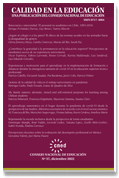Following Peers or School Rules: The Effect of Social Norms on the Behavior toward Gender Inequality
DOI:
https://doi.org/10.31619/caledu.n57.1223Keywords:
social norms, hostile sexism, benevolent sexism, gender violenceAbstract
Social norms impact on people's beliefs and behaviors. Thus, social norms that set up and validate equality between men and women could foster egalitarian attitudes. Given the importance of norms within social interactions, the aim of this study was to analyze the effect of school and peers' egalitarian norms on attitudes towards gender inequality among adolescents. Specifically, we studied whether norms affect the scales of hostile and benevolent sexism, and the justification of gender-based violence. In a correlational study with a sample of school students (N=547), we found that when the peer norm does not support gender stereotypes -that is, it is an egalitarian norm- it predicts lower levels of sexism and justification of gender violence. The school norm turned out to be not decisive. These results show that peers" social norms can be used as a vehicle for social changes to generate equality between men and women in the school context.
Downloads
Published
Issue
Section
License
Copyright (c) 2023 Calidad en la Educación

This work is licensed under a Creative Commons Attribution 4.0 International License.
Authors retain their Copyright and only transfer a part of these to the journal, accepting the following conditions:
Authors keep their rights as authors and guarantee the right to the journal for the first publication of their work, which is simultaneously subject to the Creative Commons Attribution license allowing third parties to share the study accrediting the author and first publication in this journal.
Authors may adopt other non-exclusive license agreements for distribution of the version of the published work (e.g. inclusion in an institutional thematic file or publication in a monographic volume) accrediting initial publication in this journal.
Authors are allowed and recommended to share their work over the Internet (e.g. in institutional telematic files or their website) before and during the submission process, which may lead to interesting exchanges and increased citation of the published work. (See The effect of open access).

